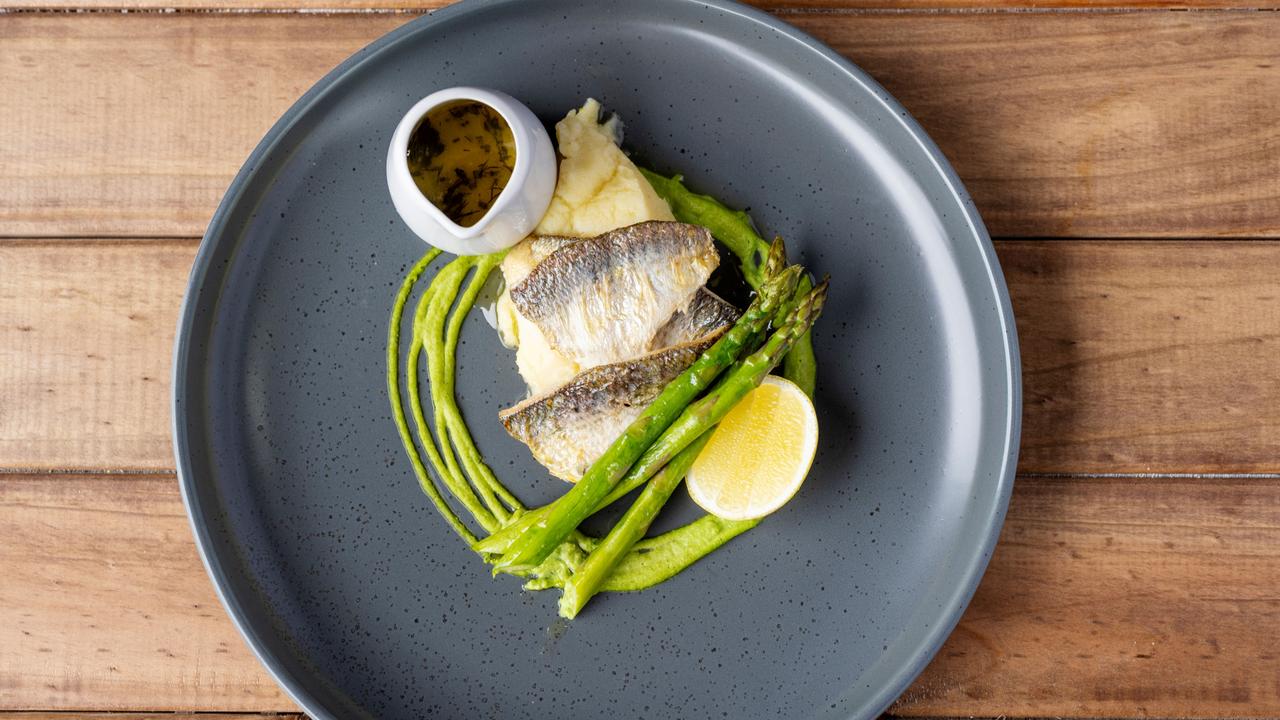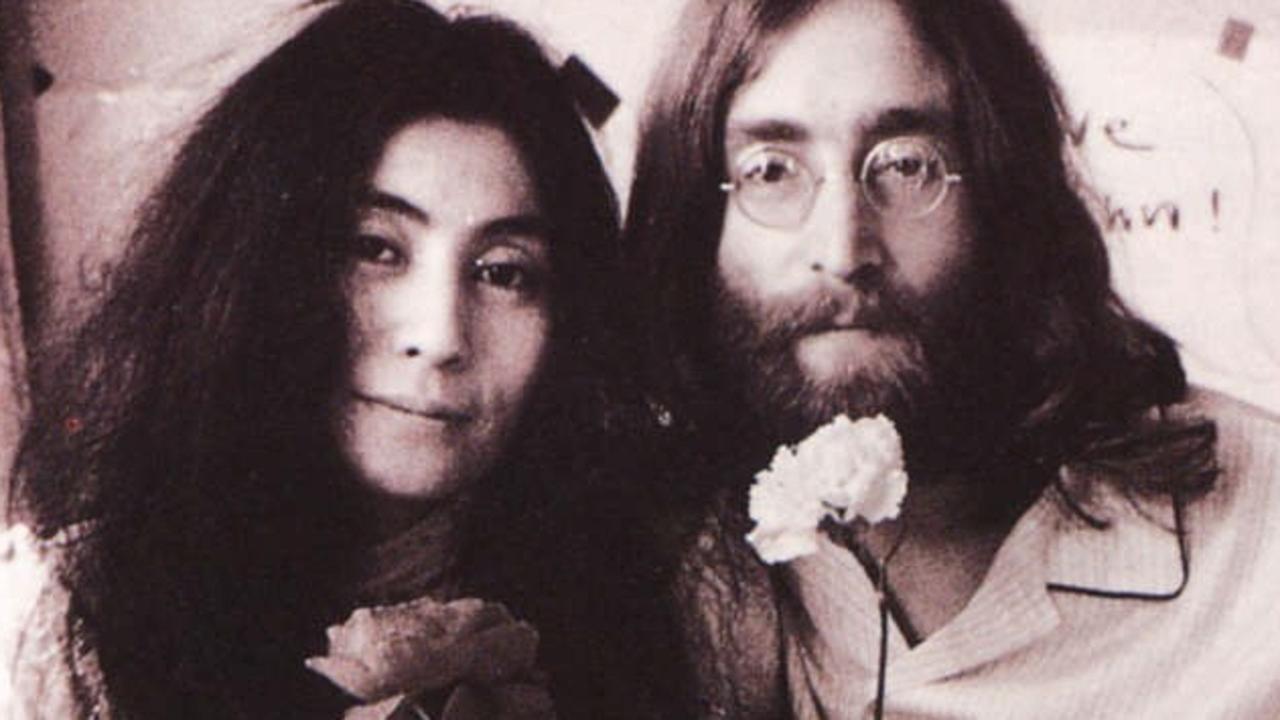One devastating, empty year since losing their soulmates, four South Australians bereaved by COVID-19 have an important message
In April 2020, four South Australians lost their lives to COVID-19 in the space of six days. A year on, their spouses have united to share an important message. Listen to this story as a podcast.
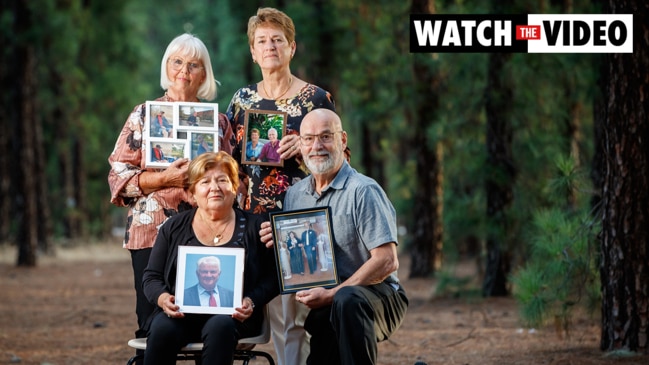
SA Weekend
Don't miss out on the headlines from SA Weekend. Followed categories will be added to My News.
Until tonight, they had been four strangers, invisibly bound by a unique type of grief no one else in South Australia could comprehend. But now, as the sun sets on a perfect autumn day in Adelaide, they chat quietly. Sometimes they laugh. Other times they hug. Occasionally, they wipe away their tears.
Each of them clutches a framed photograph. It’s their favourite picture of the one they lost. The person with whom they had shared their life. Until this time last year. Until the pandemic.
On this night, to commemorate 12 months since that one harrowing week when four South Australians lost their fight against COVID-19, their families have agreed to meet SAWeekend. To reflect on their lost loved ones and their own battles with the disease.
LISTEN TO THIS STORY IN PODCAST FORM
“Can I give you a hug,” Sandi Todd asks Elisabetta Ferraro, who nods as 12 months worth of emotion spills over.
Sandi is the widow of Malcolm Todd, who died, aged 76, in the Royal Adelaide Hospital’s intensive care unit on April 8, 2020. Elisabetta’s husband Francesco, 75, was the state’s first COVID death.
He died in the same unit two days earlier. Also here tonight are Veronica Leaney, whose husband Roger died on April 11. He was 74. And Stephen Lavender, whose wife Linda died the same day as Malcolm Todd. She was 62. They also both died in ICU.
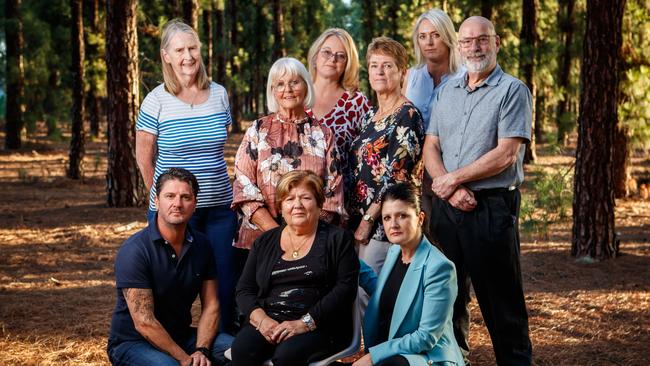
The four loving grandparents had each suffered catastrophic organ failure. None woke from induced comas after ventilators and life support machines were switched off. Lockdown social distancing regulations meant none could have proper funerals.
When they all died within six days, authorities – and the public – feared it was the start of a horrifying wave of death, which had already engulfed much of the globe.
But remarkably, they remain SA’s only COVID fatalities. Globally, the virus’s death toll is almost three million. More than 800 have died in Victoria. But SA’s relative immunity from the worst of the pandemic is of little comfort to these four families.
Their worlds have been turned upside down. Their shattered lives will never be the same.
But now, amid the hugs and the tears, they speak in hope their experiences can help prevent more grief and warn the public against complacency.
FRANCESCO FERRARO
Died April 6, 2020, aged 75
Every day, Elisabetta Ferraro drives seven minutes from her Campbelltown home of 49 years to visit her husband’s grave at Payneham Cemetery. It’s a ritual she never misses. In fact, she goes twice a day on weekends.
Francesco, known as Frank, was her husband of 51 years, a father-of-four and retired plasterer. He became SA’s first COVID-19 fatality when he lost his 13-day fight for life just after 6pm one Monday evening.
Elisabetta spends up to two hours at a time at her husband’s grave, reflecting on seven decades of friendship and love. She often sings him her favourite Italian love songs – the same ones Frank, a hopeful romantic and practical joker, once serenaded her with as he played his piano accordion.
His laugh rings in her ears as she visits his grave, a site the family chose because of its shady location near the graves of children. Frank loved kids.
“I never stay less than half-an-hour, sometimes it is 45 minutes, an hour,” Elisabetta says. “The first thing I say is the Rosary. I hear him talking. Sometimes … I feel him say ‘go home’. Because I know the way that he is. He said ‘that’s enough. You don’t need to stress too much on things’.”
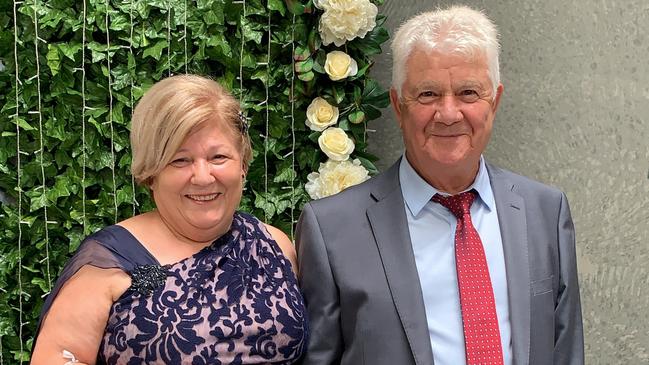
The pair grew up in the same small village in southern Italy. Love blossomed early, but their teenage relationship was tested firstly by family differences and then the tyranny of distance.
Elisabetta moved to Australia alone in the early-1960s because Frank had no $200 sponsorship. They reunited five years later when she returned to Italy and emigrated to Adelaide in 1968 when Frank secured government backing as a labourer.
They built a life from nothing.
Frank, always immaculately dressed, worked seven days a week while his wife did nightshift at factories or hotels, including the Hilton when it opened. They raised three children – Enza, now 50, Claudio, 49, and Orietta, 46. A fourth child was stillborn.
Family always meant everything to them and they formed close bonds with grandchildren, Isabella, 23, Alessio, 20, Arlo, 15, Diego, 14, Mattia, 11, Nayla, 10, Giada and Tao, both seven. Frank and Elisabetta were in Melbourne on March 14 last year for a family wedding. They also visited friends and multiple venues.
“It was a beautiful, beautiful night … there was also a beautiful evening before the wedding, because when you get together, it’s nice,” Elisabetta says. “We loved it. We have a lot of fun. I cannot say I regret (it) because Frank was very excited to go. If I tell you the truth nobody was concerned.”
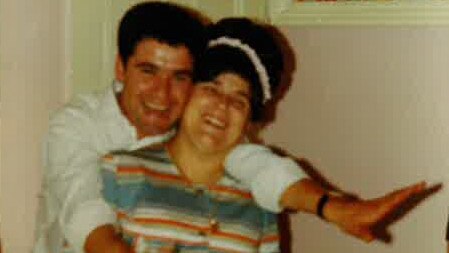
They returned to Adelaide three days later, shortly before state borders shut. Neither felt unwell but Frank, who had no underlying health problems apart from mild diabetes, had niggling doubts as he watched the unfolding Italian crisis.
So he cancelled the weekly Thursday night dinner he and his wife had hosted for more than 30 years. These three-course meals had become folklore, boasting enough pasta, meat and vegetables – many homegrown – to feed a small army.
Daughter Enza vividly recalls the conversation with her father about cancelling the traditional family catch-up.
“There’s too much going on at the moment. Let’s just have it next week when everything calms down, I don’t want anyone to possibly catch anything,” Frank said.
While asymptomatic, their children insisted on COVID-19 tests. Protocols then reserved checks for people with symptoms, so they told doctors they had sore throats.
They tested positive on March 21 and isolated at home. They had no symptoms until four days later when Frank suddenly fell violently ill, just hours after enjoying two bowls of his favourite pasta e fagioli.
His fever spiked to almost 40C, he had a nasty cough and trembled uncontrollably.
They called an ambulance at 11pm, but because of new COVID protocols, it didn’t arrive until 1am. “We were very worried,” Elisabetta says. “I say to him ‘I cannot come with you’. He say ‘it’s OK’. He not say much. Everyone was in a hurry.”
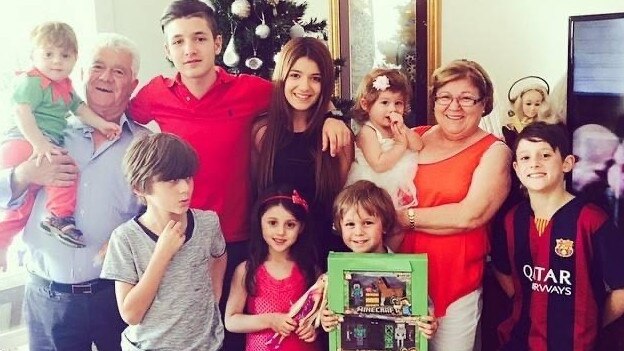
She kept isolating at their north eastern suburban home, forced to communicate through doors or windows.
Over the next few days they spoke multiple times a day over the phone or on video calls. She never gave up hope.
“To tell you the truth, I never thought he’d never come out again, never,” she says. “My mind kept thinking positive, he going to make (it).” But Frank’s condition rapidly deteriorated and he was rushed to ICU three days later. He never left.
Doctors gave Enza three medical updates a day, which she would relay to her family. After days of negotiating to see her father, Enza thought her requests were being granted when she was asked to go to the hospital on a Monday afternoon. Instead, she was told doctors could do no more.
They scrambled to set up communication to the locked down ICU room of their beloved husband, father and grandfather.
They said their goodbyes via Facetime.
It was the hardest of farewells.
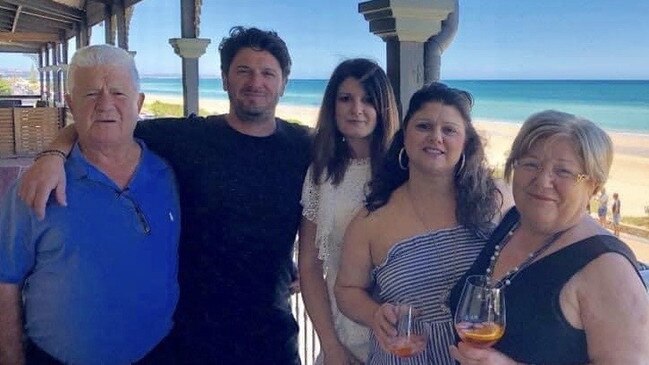
“(It was) bad,” Elisabetta, a devout Catholic, whispers through tears. “I didn’t want him to go. I was screaming in the room. Claudio said there’s nothing they can do Mumma, he has to go. I didn’t want to accept.” In the past 12 months, the family has rallied around the matriarch who says she misses “everything” about her late husband. Routines, including family and grandchildren dinners, have continued. A memorial is planned.
“It’s been a very, very bad year for me and my family,” she says. “He was a rock of our family, my rock and the … grandchildren. We miss him so much. Every day more. All the time that has gone past, I miss him more and more. He was a great husband, an excellent father, a precious nonno.”
Elisabetta also pays tribute to medical staff who battled to keep Frank alive, the community for their support as well as Premier Steven Marshall – who wrote to all families – local MP Vincent Tarzia and her council for personal letters of condolences.
And she pleads for people to follow the rules: “Because I lost my husband, I don’t want other people to have a loss of life.”
LINDA LAVENDER
Died April 8, 2020, aged 62
Stephen Lavender has spent the past 12 months paralysed by a fog of grief, mourning a new life cruelly snatched from him. His 2020 had begun with such promise – renewing the wedding vows he had first taken with wife Linda almost 38 years ago.
The couple had vowed to start a new chapter. One of travel, cruises, house painting, gardening and more time with their four beautiful grandchildren.
Those plans are now painful memories after Linda became SA’s second COVID-19 death, and the first linked to an outbreak which claimed the lives of 28 passengers on the Ruby Princess ship. The Lavenders, on their first cruise, were among 89 patients in SA Health’s biggest virus cluster. Linda spent 13 days in the RAH – five in ICU.
Her husband and devastated children, Jaime, 33, and Matthew, 31, said their goodbyes via a laptop video link before she died at 2am on April 8. She had fallen ill just three weeks’ earlier. Stepson Corey, 44, was stranded in NSW when she died.
Stephen, 68, says the grief of losing his wife had clouded his mind and left him struggling with life. “I’ve really not come out of grieving, I can assure you of that,” he says. “Grieving is something I’ve never had to do. Kerry (his psychologist) said ‘grieving is you trying to repay the love you did not get to give’. And that’s why I’ve been grieving so much and still am.”
He says the psychologist has helped him refocus after 12 months, in which he admits he achieved very little. The retired hardware worker has nearly finished painting his southern suburbs home, looks after his grandchildren and tends to his garden. He doesn’t think much about what’s coming up next. That’s tomorrow’s problem.
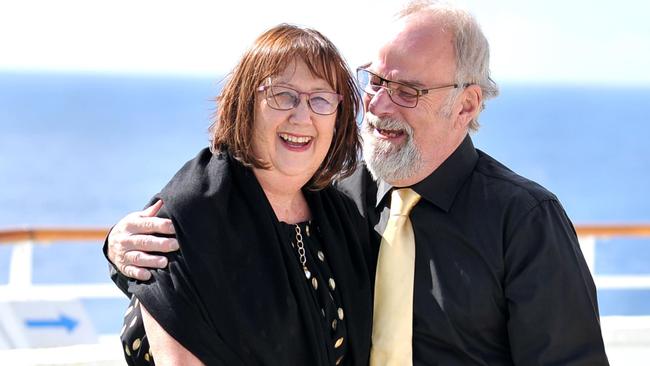
He is especially fond of a garden arrangement outside his bedroom window which he dubbed Linda’s “leaning tower of flowers” – because she planted them crooked.
The flowers’ planting box is also now home to some of her ashes. Linda, a merchandiser to Bunnings, was also a talented chef and other ashes are scattered under the kitchen area slab at Corey’s new house so she can “help out with the cooking”. More of her ashes are spread in sand dunes near their home, and friends will gather next weekend to scatter the rest along a nearby beach. Stephen says her biggest hobby was her grandchildren, Tyla, 12, Ashlyn and Jorja, both 11, and Madilyn, 10.
She was also a passionate Adelaide Crows supporter. He admits tears still flow regularly, especially when he pays tribute to her “amazing” cuddles or her deep brown eyes.
But he is slowly rebuilding his life.
“So many things change when you lose your better half,” he says. “I can’t go to restaurants anymore. I don’t have a lot of real contact with people. Friends have stuck by me and they’re magnificent, as are my family. It has been so hard being without Linda.
“Some people can grieve for a short time and move into the next stage of their life. I think I’m getting there and then I go backwards. It’s just so hard a lot of the time.
“Just before she passed away she sent me a message … remember the good times and try to forget the bad. But the bad times actually made us stronger than the good times can ever do.”
On the first night of their spectacular New Zealand trip-of-a-lifetime, booked well before the pandemic erupted, Stephen “surprised the daylights” out of Linda when he asked to retake their vows.
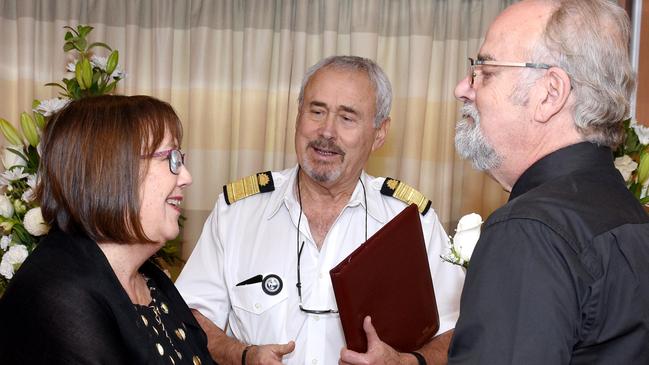
“(I thought) it can be like a honeymoon cruise for us,” he says. “And it really was. That’s what your relationship is with someone you love that much. And she loved me that much. So it was hopefully the start of a whole new life but we never got there, unfortunately. That’s in the past now.”
A photo from their small ceremony, attended by a celebrant, photographer and the ship’s captain, sits proudly in a room in their home dedicated to remembering her.
“She walked down the aisle with the ship rolling,” he laughs. “And it looked like she’d had too much to drink at the time. It was funny. She was just waving around as the ship rolled. She got to walk down the aisle, which was a beautiful thing.”
After flying from Sydney to Adelaide on a Virgin Airlines flight with other infectious passengers, the Lavenders were tested for COVID-19 the next day at Flinders Medical Centre. The results indicated Stephen was in the clear. Linda tested negative for COVID-19 but positive for influenza A.
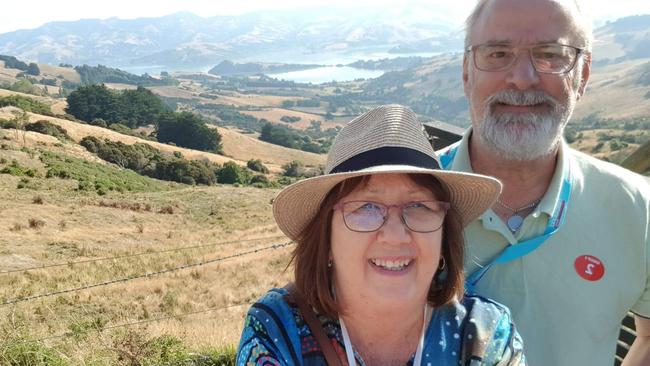
An SA Health official rang daily to check on her but Linda insisted she only had a “bad dose of the flu”. But within a week, doctors advised them to call an ambulance.
In hindsight, Stephen says his wife had classic COVID symptoms such as a nasty cough, fever, headaches and sore throat.
He regrets not pushing for another check earlier. He returned a positive COVID test just days after she died but had no issues.
Stephen, who directed cards and flowers to shocked hospital staff and later shaved his head for a Bunnings COVID research fundraiser, remains full of praise and thanks to RAH medicos. He also pleads for people to get tested and vaccinated.
“This is serious, it is real, and people need to take it a lot more seriously than they are,” he says. “Please everyone I hope no one else has to grieve like me or like the other (bereaved) people I (have) met.”
MALCOLM TODD
Died April 8, 2020, aged 76
When Malcolm Todd sat down 12 months ago and complained of having no energy to dig a trench for a rose garden, his wife Sandi had no inkling of the tragedy that was about to unfold. Instead, she simply thought that a big weekend in the Barossa Valley had left him exhausted. “He said ‘I’m finding it hard to get my arse off the chair. I just feel I can’t do anything’,” Sandi, 75, recalls.
“And I said ‘well don’t’. He said ‘nah, nah, nah, I want to get that rose garden out’.
“I went out to him and said ‘Mal, you’ve got the rest of your life to do that garden, don’t worry about it. If you don’t feel like it, leave it’, thinking he’s got years to go. I can still see him sitting in the chair with his shoulder hunched over, looking like every move was an effort. And he was very active.
“Even then, I didn’t twig that anything was wrong.” What neither realised was coronavirus was rapidly attacking his body.
“I knew Mal was tired from the big weekend we’d had,” she says. “But it never occurred to me it was any more than that … but obviously it was the virus hitting him.”
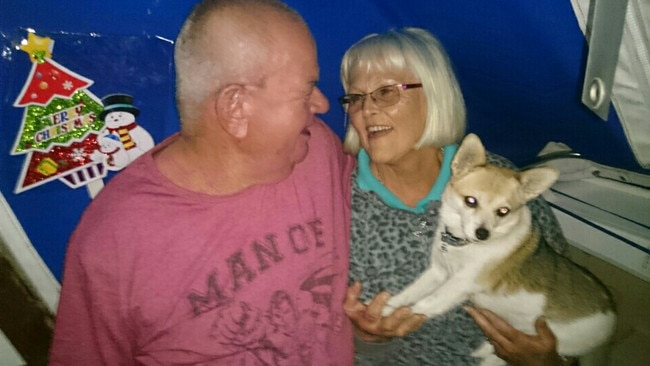
Just over a fortnight later, the retired Riverland tourism operator, a father to three and grandfather to six, was dead – 16 days after he tested positive and just hours after Linda Lavender passed away.
Sandi, who has also struggled with virus complications including fatigue, was in isolation 230km away in Barmera and had to say goodbye to a comatosed Mal via Skype.
The couple, who had their 32nd wedding anniversary four days before, was among 39 patients in a Barossa Valley cluster, which occurred during a visit by a food and wine tour group led by their son Craig, a top Switzerland-based chef. On March 14, the couple had driven 170km to Lyndoch Hill winery to have dinner with Craig, 56. Mal fell ill with a sore throat on March 20. He was tested the next day as his fever spiked and chest hurt. SA Health officials discovered his illness four days later, and had him immediately flown to the RAH, where his condition dramatically worsened.
“We’d had a really good weekend, had a really good night and drank far too much wine and all of that,” Sandi says. “Of course, had we not gone to the Barossa it wouldn’t have happened. You do regret it but you can’t blame anyone … because nobody knew. We had no clue of any threat of coronavirus in SA at that time. Deep down inside, you do feel a little guilty, particularly about passing it on to a very dear friend in the Riverland. And you think ‘God, I wish I hadn’t done that’ but you can’t undo it.”
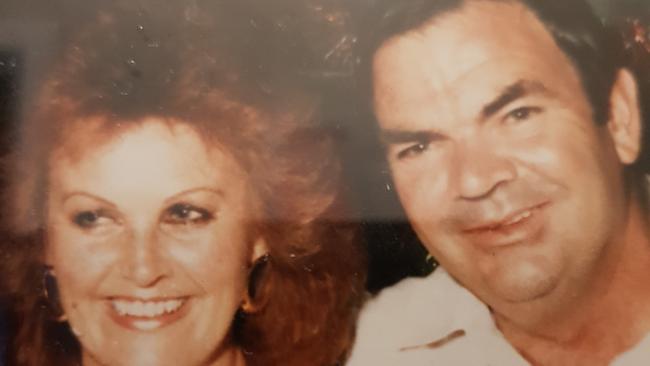
Suddenly losing her “larrikin”, handyman has been her greatest challenge.
“(It’s been) the worst 12 months of my life,” she says. Her grief is compounded by a string of family anniversaries at this time of year and she gets distressed about “irresponsible people” not being vaccinated or getting tested for COVID-19. “It has been very, very hard,” she admits. “You think about what it might be like, to lose your partner, but you just never really realise what it’s going to be like until it happens. A part of you is missing without the other one. It leaves a great gaping hole in your life.”
She keeps active, continues to drive a local school bus and is an avid Riverland Cruising Boat club member, which will this week host a memorial for her husband, who also left behind their daughter Michelle, 55, youngest son Dale, 42 and grandchildren Megane, 27, Margaux, 25, Tabitha, 27, Lilly, 9, Kaley, 7, and Eddie, 4.
Sandi says she has been humbled by the “fantastic support” from family, friends and the wider Riverland community – including those who donated roses for “Mal’s garden” – and thanks doctors. She keeps busy because the “funniest little things will pop into your head” that suddenly “give me a jog and pull at my heart strings”.
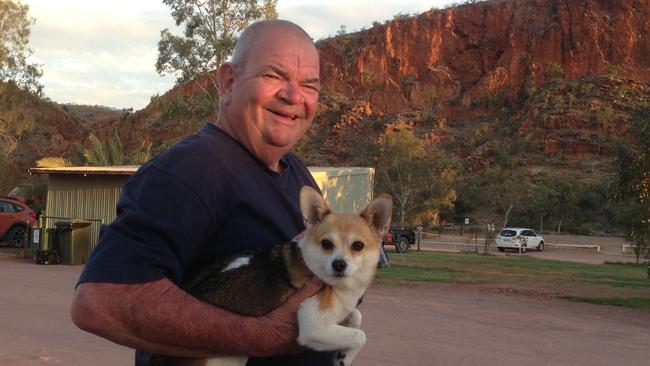
“In the beginning … I’d be dissolving into tears all the time,” she says. “I find myself still dissolving into tears very, very easily but you sort of manage to get it back under control quicker. I guess I am doing as well as can be expected in the circumstances. It’s a bit of a cliche but that’s about how it is. It has been very, very hard.”
Does she think people comprehend what she’s been through? She pauses.
“I don’t,” she eventually replies. “I really don’t think you can comprehend it until you go through it. He was a wonderful man. I was so lucky to have him in my life. I’m really thankful for that. I miss him all the time. Just all the little things ... everywhere you go all of a sudden something pops up and reminds you of the memories. People say memories are wonderful things to have but they’re also very painful because they remind you of what you’ve lost.”
In the early days after Mal died, Sandi would try to live by a favourite old axiom of his that every day was a brand new one. But she soon realised it gave her little comfort.
“I thought, ‘no it’s not a brand new day, it’s another day to be endured’,” she says.
“People generally say the nights are the worst, but I found waking up in the morning to be. I miss him not being with me because we would always (be) together … him being there. It’s really hard and people that have been through it tell me it never goes away. But you just learn to live with it. And it’s still even hard to really accept that I’ll never see him again now. I know I won’t but it’s still really, really hard to accept.”
ROGER LEANEY
Died April 11, 2020, aged 74
Veronica Leaney suspects she is probably still in denial. The 73-year-old grandmother says she has struggled to grieve for her soulmate of five decades, Roger, or properly shed tears over his death.
“It’s been nearly a year and I feel sorrow but I haven’t wept tears of grief yet,” she says. “My family has been a little like me. They are struggling to grieve. We love that we are really so close and we hold each other together. My daughters and my grandchildren are so precious to me. I don’t know how I would have survived this time without them.”
Roger, a retired train diesel fitter, respected netball umpire and active grandfather, died 19 days after testing positive, becoming the second SA-based death from the Ruby Princess ship.
His wife misses his companionship but has accepted the challenge of life as a single woman. She has learnt how to tow a trailer, helped a friend move to Clare and has towed a caravan on family holidays in SA.
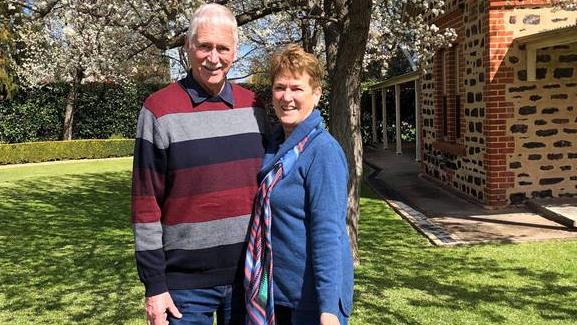
During a family gathering last October in Port Elliott, they scattered some of Roger’s ashes along the beach, a place he loved to visit. The rest are in a reserve opposite their northern suburbs house, where they have also asked Salisbury Council to install a bench in his memory.
Veronica fell ill first on March 20, the day after returning home from their cruise, with a cough, headache and body aches. They both initially suffered severe gastro, but Roger had no other symptoms.
He was diagnosed with the virus on March 23 and, a week later, collapsed in the middle of the night and was rushed by ambulance to hospital. He went “downhill very quickly”, Veronica says. He suffered such a cataclysmic breakdown of the body’s system that Veronica takes some solace in his death because his quality of life, if he’d survived, would have been minimal.
“There’s an empty chair at the dining table, life has changed and … is different,” she says. “I really have struggled to grieve. Well, I guess I’ve grieved in my own way.
“I really honestly think that comes back to thinking that if he’d survive, how? What would his outcome have been and could it have just been dreadful? If he had total organ failure, which is the reason he didn’t survive, then his options of meaningful life weren’t ever going to happen. I guess I’ve accepted that.
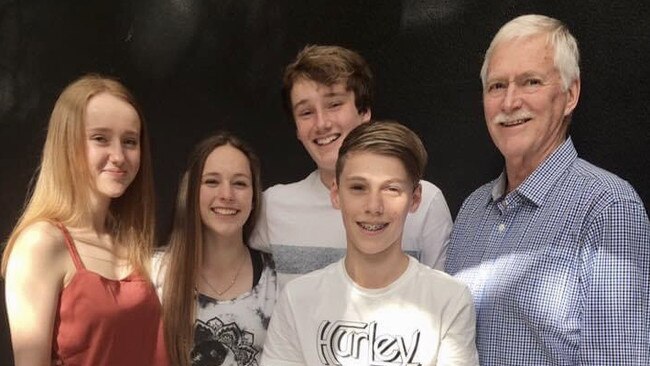
“You just keep going. I’ve never thought I’m alone, I’m totally supported by my family, my friends, my church and my neighbours. So you just go on with it.”
Roger left behind daughters, Jo Tonkin, 51, and Cheryl Ogden, 49, and grandchildren Auburn, 21, Jess, 19, Darcy, 19, and James, 17, plus their pet cat Ash.
“I’m not going to think of it as a waste of life,” Veronica says. “I’m reasonably strong and very easily independent, and I can get on with my life. We made two beautiful daughters together, we have four beautiful grandchildren – thoughtful, kind people. His life wasn’t wasted. Tragedy happens every single day.
“There are worse things than Roger dying in a hospital, never left alone, not in pain, not aware of his actual fight for life. Not being full of fear. Even though our time together was cut short no one knows when our time is up. We had 52 years together. My goodness, so many people don’t get that. That’s how I’ve been able to cope with all this, I think – (and) probably also why I really haven’t been able to grieve because I keep coming back to positives in a sad situation.”
The retired switchboard operator now volunteers at a local charity store, where she occasionally educates customers on COVID from a very personal experience.
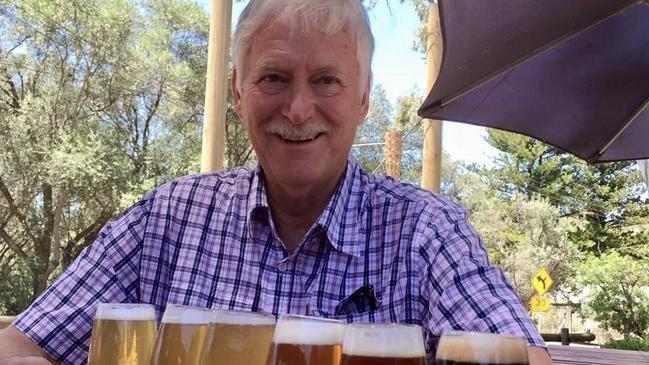
How does she find people’s reactions, and often blasé attitudes towards QR codes, social distancing or other COVID-19 health and safety measures?
“Well, that’s really interesting because often that happens,” she says. “People will come in and they quite openly mouth (off) about the government shutting everything down and (say) it shouldn’t be happening, there’s no COVID around.
“Sometimes (I) say, ‘Well, this is what happened to me and it’s a real thing’. And then they are shocked because so few here in South Australia have any knowledge of anyone who’s had COVID.
“So often … they go away with a different attitude. I feel as though in some way I’m educating people. If I can make them realise this is a serious thing, that might be my job, who knows? I don’t always. But people are usually grateful. And they’ll say thank you for sharing your story. If it makes a difference in a small way, then that’s great. It has an impact.”




